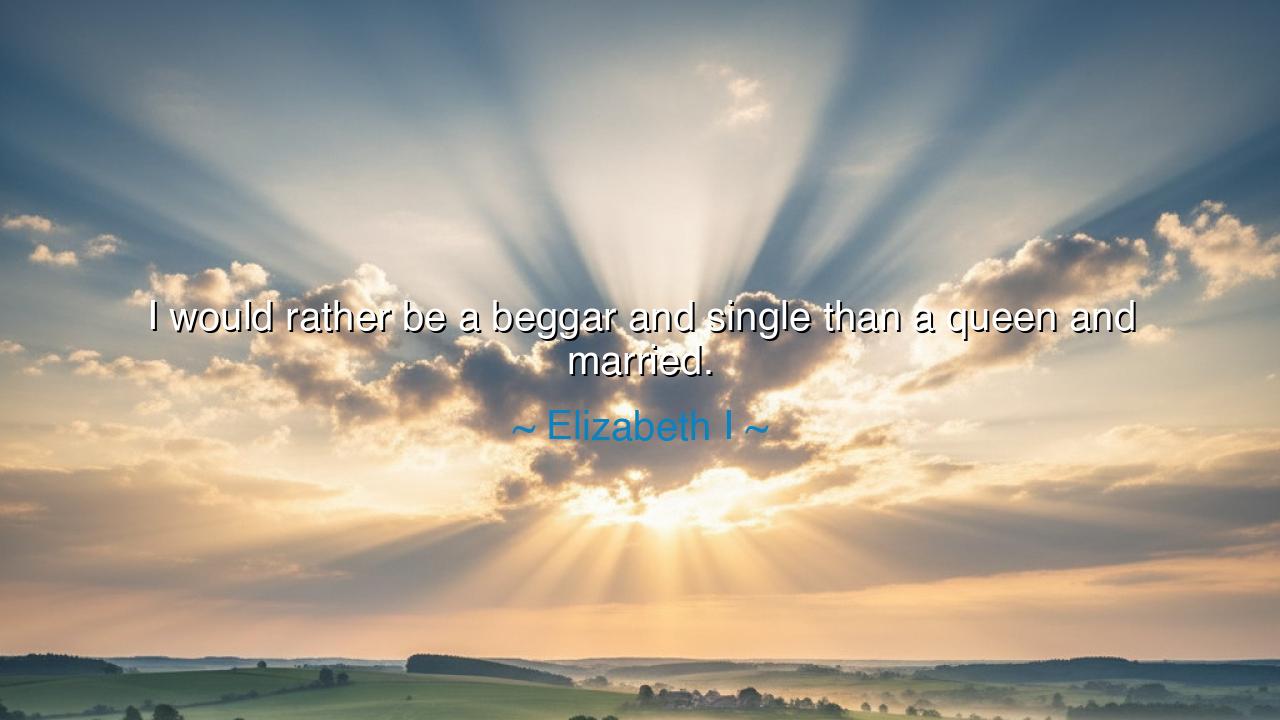
I would rather be a beggar and single than a queen and married.






"I would rather be a beggar and single than a queen and married." These words, spoken by Elizabeth I, resonate with a deep and powerful truth about the nature of freedom and the sacrifices that often accompany power and relationships. Queen Elizabeth I, one of the most powerful and influential monarchs in history, understood that the freedom to lead and to live on one's own terms is more valuable than the security or influence that a relationship might bring. Her declaration speaks not only to her personal experience but to the universal tension between independence and the demands placed upon us by others—whether in the form of marriage or the obligations of duty.
In the ancient world, there were many who understood the complexity of freedom and marriage—the tension between personal desire and the demands of society. Consider the life of Socrates, the great philosopher, who famously chose a life of intellectual freedom over the comforts of family and societal norms. Socrates was married to Xanthippe, a woman known for her sharp tongue and difficult temperament. Yet, he often retreated into the world of philosophy, choosing to engage in dialogue and reflection rather than yield to the traditional roles of a husband. Socrates understood that true wisdom and freedom came from the ability to choose one’s own path, even if it meant navigating the complexities of personal relationships.
Similarly, Antigone, the tragic heroine of Sophocles’ play, chose to defy the king and society to bury her brother, adhering to her own moral code over the dictates of marriage or political power. She rejected the conventional path that demanded loyalty to the crown, choosing instead the freedom of conscience. Antigone’s actions, though resulting in tragedy, symbolize the strength found in following one’s own principles, regardless of the consequences. Elizabeth I, too, chose her freedom, rejecting marriage and the compromises it might bring, even at the height of her reign, when the world expected her to marry and produce an heir. Like Antigone, she knew that duty to herself and her nation demanded a different kind of sacrifice.
The context of Elizabeth I’s reign was fraught with the pressure to marry, as many saw the monarchy as vulnerable without an heir. Yet, Elizabeth, the Virgin Queen, refused to marry, valuing her independence and the sovereignty of her reign above the traditional expectations of marriage. In choosing to remain unmarried, she retained her power, her agency, and the ability to rule without the constraints of a husband’s influence or the potential loss of political freedom that a marriage might bring. Elizabeth’s decision to remain single was not one of loneliness but of conscious choice, a recognition that the freedom to lead and maintain control over her destiny was worth far more than the comforts or compromises that a marriage might offer.
The lesson in Elizabeth I’s words is clear: freedom and self-determination are often priceless. Whether as a ruler or as an individual, the choice to live on one’s own terms, free from the constraints of external expectations, is a powerful form of self-sovereignty. Too often, we are pressured by societal norms—whether about love, marriage, or family—to sacrifice our individuality or autonomy for the sake of conformity. Elizabeth’s example teaches us that the value of independence—the ability to chart our own course and to live by our own principles—should not be undervalued, even in the face of external pressures.
In practical terms, this means we must learn to embrace our independence. This does not mean rejecting relationships or love, but recognizing that our happiness and success should not depend on external validation or the approval of others. We must give ourselves the freedom to make decisions that align with our values, even when society, or our families, may expect something different. Elizabeth I’s refusal to marry and her choice to remain in control of her reign stand as a reminder that self-determination is a powerful and precious thing. By learning to trust ourselves and our judgment, we can make choices that honor our truth and our path.
In conclusion, Elizabeth I’s statement serves as a timeless reminder of the strength and power that comes from independence. Just as the great figures of history, from Socrates to Antigone, chose their paths of freedom and self-expression, so too must we value the freedom to make our own decisions in life, even when it means standing against the pressures of society. Freedom is not a luxury—it is an essential part of living a meaningful life. Let us then embrace the power of independence, knowing that in doing so, we gain not only the ability to chart our own course, but also the strength to live authentically and boldly, just as Elizabeth did, both in her reign and her personal life.






AAdministratorAdministrator
Welcome, honored guests. Please leave a comment, we will respond soon